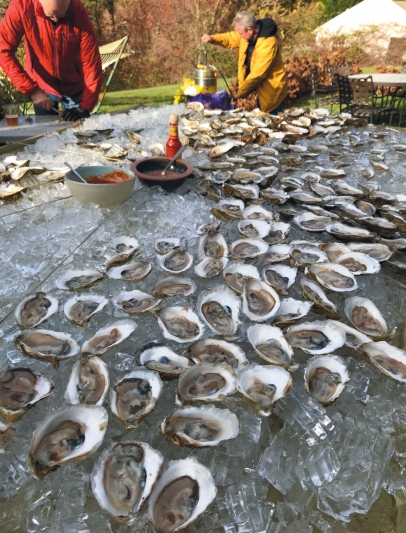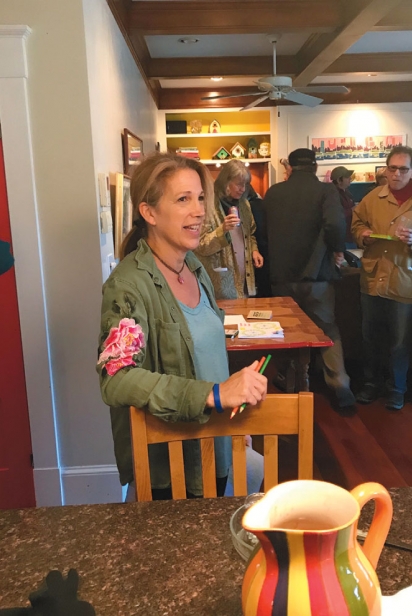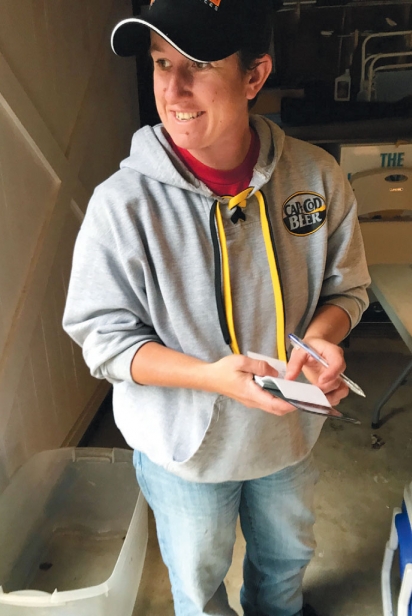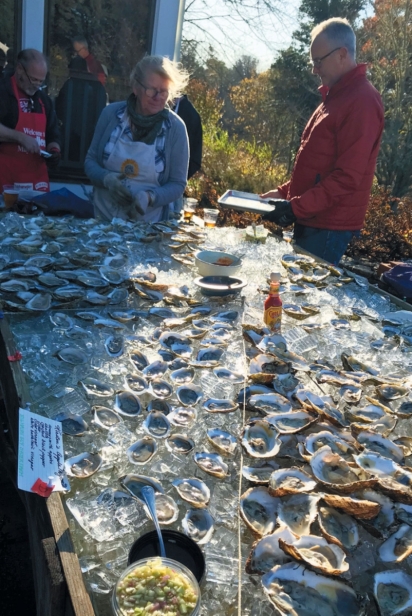Taking it Slow
Catching up with the Cape’s Slow Food Convivium
For nearly three decades, the Slow Food movement has celebrated and recognized the value of deliberately prepared traditional and regional cuisine, the Zeitgeist for true epicureans. In 1989 Carlo Petrini, an activist, founded Slow Food out of concern that classic Italian regional foods and styles of preparation were being forever changed. Delegates from fifteen countries convened and endorsed a Slow Food Manifesto, that Slow Food should be good, clean and fair: taste good; be produced cleanly; be environmentally- and animal-friendly; and ensure workers are compensated fairly. The Slow Food symbol is the humble snail, who calmly munches its way through life. Somewhat paradoxically, snails are also a beloved culinary specialty in Northern Italy, where the movement was founded.
The movement arrived on American shores around 2000 and washed ashore on Cape Cod in 2008. That’s when Mary DeBartolo, proprietor of The Local Scoop, an Orleans frozen dessert destination, founded a local convivium, Slow Food Cape Cod (SFCC). Convivium is a more fitting term than chapter, as it derives from the Latin words for feasting or banqueting together (con +vivo).
DeBartolo had recently returned from a James Beard Foundation weekend retreat where she learned the simple steps to create a local convivium. She gathered a diverse group of local educators, parents, and design and culinary folks for the convivium team. In 2009, Rachel Hutchinson, who works in natural resources with a focus on the shellfishing industry, and Amy Henderson, a National Service Program steward in natural resource management, came on board.
Current Chairperson Hutchinson was attracted to the movement by the global support for local sustainable food producers. DeBartolo added that the local community is then, in full circle, recognized worldwide. Slow Food gave a name and a mission to what Henderson, the convivium Secretary, and others were already undertaking locally.
DeBartolo said her first step after creating the convivium was to walk the Orleans Farmers’ Market to discover current seasonal offerings and then connect with Audubon’s Long Pasture Wildlife Sanctuary as a venue for their first event. In July 2009, her mother, her partner, Peter Kelly, and two friends helped produce a community potluck BBQ with French Label Rouge Chicken raised by Ocean Song Farm at the Audubon property in Barnstable. Local foodies were intrigued and joined the convivium, forming a stalwart base of membership for the past ten years. There are nearly 500 people who receive the newsletter and a solid foundation support, work on and attend every event.
Over the years Slow Food has hosted or helped produce a wide variety of events and activities across the Cape to educate the community about local foods. These have included a series of dinners at Willy’s Gym in Eastham that featured locally-caught venison, rabbit and seafood; a Beef & Beer BBQ at Cape Cod Beer in Hyannis; a barrel room dinner at Truro Vineyards that raised money to help build the Wellfleet Elementary Hoop House; community suppers at the Trap Dock in Stage Harbor Chatham that featured fin fish harvested by weir fishermen; and farm-to-table dinners at Coonamessett Farm in Falmouth, Cape Cod Organic Farm in Barnstable and Cedar Spring Herb Farm in Harwich. They’ve also hosted a cheese making class, an oil and vinegar tasting at Gustare in Chatham, and movie screenings at various venues. Over the years the focus has moved from community suppers to education about the Slow Food mission and continued support for school gardens.
The Ark of Taste
The Ark of Taste is not two-by-two as the story of Noah’s Ark goes, but a living catalog of a local food or a time-honored regionally- or culturally-significant food preparation in danger of going extinct. By founding Slow Food, Petrini saw a way to forever authenticate, champion and support culinary styles that he felt could be corrupted or lost to future generations.
Since 1996, more than 3500 products from over 150 countries have been added to the International Ark of Taste. Over 200 are from the U.S., including several local foods: the Wellfleet oyster; the northern quahog; the bay scallop; and the beach plum. The iconic Eastham turnip is under consideration, but will be approved only if it is varietally different from the already approved Macomber turnip nominated by Martha’s Vineyard.
Anyone can submit a food or process to be considered if five qualifications are satisfied: it must be outstanding in taste; at-risk biologically or as a culinary tradition; able to be sustainably produced; culturally or historically linked to a specific region, locality, community or traditional production practice; and produced in limited quantities, by farms or by small-scale processing companies, for home consumption, or, in the case of endangered plants and animals, for regeneration and rebuilding.
The classic New England lobster bake is a perfect example of a culturally significant regional preparation that is in danger of disappearing, one that SFCC will be nominating. Many people do not realize that a traditional lobster bake involves a pit dug in the sand that is filled with stones, wood, seaweed and some sea water so that the lobster, clams, potatoes and corn steam together once the fire is lit. The lobster bake traditionally did not come in a to-go box, and was a reason for family and friends to work together (remember con + vivo?) and then enjoy the fruits of their labors.
Community Collaboration
For the past three years SFCC has held a local oyster blind taste test on the Saturday before Thanksgiving, when oysters are plentiful and the weather still conducive to dining al fresco. The 2017 tasting featured nine regional oysters contributed by recreational and commercial shellfishermen who shucked over 500 bivalves that were enjoyed at a potluck supper. Everyone was given an Oyster Flavor Wheel to record everything from finish linger, to umami and taste, from metallic to fruity. All tasters voted on briniest, sweetest, best looking and best overall.
A current Slow Food USA initiative is Plant a Seed: Food for Change. For this project, the local convivium and area restaurants, many who grow their own herbs and vegetables, are adding the Three Sisters seeds (beans, corn and squash) to their repertoire. When planted together, these three help each other grow and thrive. Corn stalks provide a natural trellis for the beans to climb; squash discourages weeds and pests and locks in moisture near the plant base; and bacteria at the bean’s roots adds nitrogen, which they all need to grow and thrive, to the soil.
Slow Food USA has kits ready to mail all over the country and anyone can join the campaign for their home garden. Each kit purchased buys one for a school garden. Look for some culinary events featuring this sister trio this spring and summer at restaurants around the Cape. Pizza Barbone in Hyannis, for one, will be growing some on their rooftop kitchen garden and featuring them on their specials board.
Hutchinson says, “For anyone who loves good local food, Slow Food Cape Cod is a way to bring eat local/buy local/buy organic/buy seasonal all under one umbrella.” The passion and enthusiasm that DeBartolo, Hutchinson and Henderson radiate when they articulate the direction they want to take SFCC is infectious—they plan for events that reach more people, multi-generational education and a greater understanding and adoption of Slow Food’s mission.
To conviviality!
Slow Food Cape Cod Planned Events for 2018
Wednesday, May 23 - Slow Food Cape Cod Trivia Night Fundraiser at Cape Cod Beer
Friday, September 14 - Slow Sip Event
Sunday, November 11 - 4th Annual Oyster Taste Off
For more details go to (and like) their Facebook page @slowfoodcapecod. Sign up for the newsletter at slowfoodcapecod.org.








